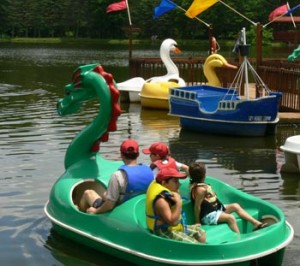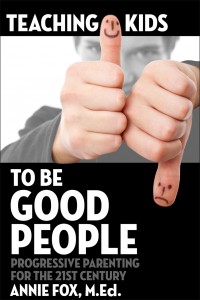|
|
July 9, 2013
 Let's ride across the lake on a dragon! Right before the light turned green I glanced out my window and saw a four-year-old swinging in front of her house. Lucky girl with parents cool enough to tie that swing on the tree. Smiling, I remembered the endless freedom of summer days with no particular place to go. Then the light turned and off I went, back into adulthood.
Summer is a portal to the land of “Who Knows Where Until You’re There.” It’s also a golden pass from the scheduling gods. (Or it should be.) Because, let’s face it, time away from routine provides the breather we all need to step back, relax, try something different, have fun, and then return to “normal life” with renewed interest and energy.
As a kid in summer, I planned my own days, each one radiating endless possibilities. In September, my new level of self-reliance stayed with me, propelling me into a new school year. Summer holds that potential for every kid, provided (s)he has the freedom and time. But that doesn’t mean vacationing kids should veg out for days in front of one screen or another. That’s as unhealthy as corralling them into daily math & reading drills. Please don’t do either. But please do encourage fun and learning.
Let’s define terms. Learning is anything that exposes kids to new ideas, stretches the mind, promotes new ways of thinking, builds skills and knowledge, and/or encourages creativity. Summer can be a wonderful time for all sorts of special learning experiences. And because most parents are also “on break” during parts of the summer, families can learn together. Here are a few tips to make fun and learning part of this summer:
1. Call a family meeting. Discuss special projects and activities the family can take on during the summer. Let kids take the lead but you should also bring some ideas to the table by first checking the Events section of your local newspaper, your town website, or search for “Summer Activities for Kids and Families (your city name).” Educational/cultural institutions have plenty of program offerings. Find out what’s available, talk it up to your kids, and take part.
2. Be creative. Don’t let the close of school close the mind. Since many schools have cut out creative arts, summer is a great time to bring back those opportunities. Make arts and crafts. Make music and home videos. Make food and share the delicious goodies with your neighbors. When you do that, you’re also teaching generosity.
3. Have an adventure. Gorgeous weather is a terrible thing to waste. Seize the day and tap into a child’s natural desire for adventure. Unfortunately, many kids only satisfy this by playing computer games. But real trails, parks, streams, and shorelines are out there waiting for young adventurers. Google “Hiking (your city name)” and discover nearby natural environments for your family to explore. Print out maps before you go and let the kids help navigate.
4. Visit your public library. (We remember books, don’t we?) Ask a librarian for recommendations or better yet, have your children talk to the librarian about the kind of books they enjoy. Gather the family together each evening for a story or chapter or two. (Here are some free classic fairytales to get you and the kids in the mood.) Whatever you’re reading, talk about the use of language, characters, and plot points. Rather tell stories than read them? Here are some storytelling tips from a master.
5. Watch classic films. Summer themed or otherwise, a great film is a treasure trove of educational possibilities. Share some of your favorite films from childhood and let your kids choose their favorites. Discover new ones, including kid-friendly foreign films. Make popcorn! Snuggle! Critique the films! It’s all learning, as in learning what it feels like to be part of a loving family. (How else will your children be able to re-create this sense of “us-together” for their own kids some day?)
Twenty-first century childhoods are different from the ones we had. Yet, summer still has the power to inspire dreaming. During the school year, our kids carry a lot on their shoulders and in their psyches. They need down time. You do too. When we use summer to play with our kids and engage in creative, thoughtful activities, we strengthen family bonds and instill in children the love of learning. If not now, when? Try taking it a little easier this summer and encourage your kids to do the same. When we slow down, and have no particular place to go, we meet new parts of ourselves.
Have a happy healthy and safe summer from my family to yours.

June 24, 2013
 Flying free It’s a bit early for 4th of July, but never too early to talk about independence, especially if you’ve got tweens or teens.
In my parenting workshops I often ask moms and dads: “What did you want more of from your parents?” Answers vary, but “independence” always tops the list along with “understanding” and “patience.” If that sounds familiar then you can understand why your kids probably want the same from you. Just like us, our kids are programmed to become independent.
The moment she emerges from the dark and narrow place, the infant begins exploring, compulsively gathering knowledge she’ll use on her journey. That journey is filled with unknowns and kids are easily overwhelmed. Since they must keep moving forward (the only direction Life goes), we offer reassurance: “You’re safe with me.” “I won’t let anything hurt you.” “Don’t worry. I’m here.” And we remain vigilant. Not because the world our kids inhabit is inherently evil or dangerous. It isn’t. We watch over them because our concern for their wellbeing is programmed into the deep recesses of our mammalian brain. We celebrate when they’re happy. We commiserate when they’ve experienced loss. We fight for justice on their behalf. We do all within our power to keep away everything that is uncomfortable and unfortunate. Our kids aren’t even free to be bored!
Maybe we protect them too much.
Here’s where I make a pitch for a little old fashioned benign neglect, i.e., letting kids do things on their own with the real possibility of making mistakes and yes, even failing. Without benign neglect, 21st century kids don’t have a lot of independence to explore, get messy and mess up. Kids with over-functioning parents have trouble developing real self-esteem and self confidence. Without the freedom to experience frustration and (age-appropriate) risk-taking, tweens and teens miss major opportunities to process disappointment and build resilience.
Some questions to think about:
- What’s the difference between a parent’s natural protectiveness and over-protectiveness?
- On a 1-10 scale, how would you rate yourself as a parent? (1=I’m a totally hands-off parent, 10=I haven’t relaxed since the day my child was born!) Now ask your child to rate you. If there’s a wide discrepancy, talk about it.
- In the past year, how has your child exhibited his or her growing independence? How have you responded?
- How have you encouraged and helped your child become more independent?
- In what ways might your fears (or the fears of your partner) be an obstacle to your child’s developing independence?
As our kids move toward young adulthood, maybe we should focus less on keeping them happy and more on helping them become independent thinkers with good judgment. In order to get there, they need ongoing opportunities to fly free.
Happy Birthday, America. Here’s to independence!

November 8, 2012
I originally wrote a version of this article for TakePart.com, an interactive publisher and the digital arm of Participant Media. Check out my weekly Education posts there.
 "Help! I'm drowning in social garbage!" I’ve been answering teen email since 1997. The ongoing Q&A has made me an expert on the social garbage many 11-17 year olds slog through every day. Typical teen questions include:
- What do you do if your friend is mad at you but won’t tell you why?
- What do you do if people are spreading rumors about you and no one believes that they aren’t true?
- What do you do when friends pressure you to do stuff you don’t want to do, but you’re afraid not to because they’ll make fun of you?
Sound familiar? These might be the same issues we once dealt with, but our children aren’t responding to them the way we did before social media. When 21st-century kids experience peer conflicts, online and off, they typically respond with a level of social aggression (aka verbal violence) that damages individuals in profound ways and pollutes school climates everywhere.
In September I spoke with nearly a thousand students at a couple of international schools, one in Singapore and another in Chiang Mai, Thailand. We talked about Real Friends vs. the Other Kind, based on my Middle School Confidential series. In each presentation the kids and I discussed tough issues like: stress, peer approval addiction, and the brain’s occasional habit of working against our desire to do the right thing. Even though I was 7,000 miles from home, the comments and questions coming from these students expressed the same conflicts and emotional confusion I’ve heard repeatedly from kids in San Jose, St. Louis, and Philly.
Back in the last century, when we had a problem with someone at school, we went home for dinner with the family, did homework, and watched TV. Sometimes we even read a book to take our minds off school and social garbage. The next morning in class combatants were usually less combative and we were all better able to concentrate on whatever we were expected to learn.
Today’s kids are mind-melded with peers 24/7. School and home are equally conducive for frantic texting and getting more people involved in the drama du jour. Status anxiety regularly submerges so much mental real estate, our students are often flooded with destructive emotions. They can’t think clearly when they’re upset. No one can. Which is why the adults who live and work with kids need to actively teach kids to be good people, otherwise, their moral compasses will be calibrated solely by their equally clueless peers. (Not a pretty thought!)

October 4, 2012
 A very personal, practical, funny guide to challenging the culture of cruelty The gestation, labor, and heavy pushing are over! On October 3rd at 4:12 PM Teaching Kids to Be Good People was born, you can get your own Kindle version of my book right here. No Kindle? No problem! You can read the book just fine on your Mac, PC, iPod Touch, iPad, iPhone, Android, Blackberry, and Windows Phone 7 with this free Kindle Reader app. Or you can get the print edition here.
Why does anyone write a book? Serious writing can I can seriously tie your brain in knots so why go through that? I can only speak for myself. Part of it is for the glory. (I’m being honest because it’s the only way I know how to write.) When I hold one of my book and I read (great) reviews, I’m thrilled. And for that moment, I’m proud of what I’ve produced. I’m feeling that way now.
After 15 years of answering teen email, I’m convinced that many kids are missing the piece that motivates them to do the right thing. When their education primarily comes from their equally clueless peers, they’re in trouble. And so are we all. That’s why I wrote the book and why you need to read it. Our kids need us to help them develop a moral compass. And we need to do a much better job teaching them how.
Not all teachers are parents, but all parents are teachers. That’s convenient since positive character traits are teachable skills that need to be learned at home as well as at school. When we teach kids to be good people, we help the world become a safer, saner, more accepting place for all of us.
How do you define a “good person?” That’s precisely what I wanted to find out, so I crowdsourced the answer from hundreds of parents, therapists, counselors, educators and teens. Eight concepts kept reappearing in their thoughtful replies: Emotional intelligence, ethics, help, forgiveness, compassion, empathy, acceptance, and social courage—all essential, teachable skills. Teaching Kids to Be Good People will help you teach these skills to your children and/or your students. Hopefully, you will become so engaged in this process that you will inspire all the kids in your life to consciously choose to be kinder to one another.
I think of it as doing my bit for world peace. Does that work for you?
 — Older Posts »
| |















